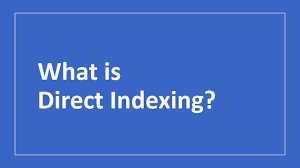Direct Indexing
Aug 11, 2021

“Indexing” is a familiar phrase in investment jargon, and a familiar concept. Money managers structure certain investment vehicles to contain all of the stocks within a particular Wall Street index, such as the Standard & Poor’s 500 stock index. This equity exposure may fit the investment strategy for some investors depending on their risk tolerance, time horizon and goals.
“Direct indexing” is a variation on this idea.
The goals are the same: to match the performance of an index. The methodology differs, however. Instead of buying one investment designed to mirror the composition of an index, the investor buys shares of each stock within the index.
Why would an investor go to such lengths?
To start, the pursuit of tax efficiency. Direct indexing can also lead to a more customized portfolio, giving an investor more ability to add and subtract companies that do or do not align with that investor’s values or market objectives.1
This article is for informational purposes only.
It’s not a replacement for real-life advice, so make sure to consult your tax or accounting professionals before modifying your tax strategy if you are considering direct indexing.
Technological advances have put direct indexing within reach of more investors today. Years ago, it was largely the domain of hands-on types with considerable assets in their portfolios. Now, there are firms that can help with this approach.
Direct indexing can encourage more trades.
A hands-on investor closely scrutinizing performance may want to consider a direct indexing strategy, especially when the equities market turns turbulent. But that can lead to more fees, which may offset the potential benefits of the approach.2
This article is strictly an explanation of the basics of direct indexing, and not an endorsement or recommendation of the strategy. If direct indexing interests you, feel free to explore the approach by consulting a professional before attempting it.
For more insights and resources, be sure to sign up for our Weekly Market Commentary. Follow our YouTube channel where we regularly post our Epic Market Minute videos. Follow us on LinkedIn, or like us on Facebook. And as always, please don’t hesitate to reach out to a dedicated service professional at Epic Capital.
Investing involves risk, including the potential loss of principal. No investment strategy can guarantee a profit or protect against loss in periods of declining values. The S&P 500 Composite Index is an unmanaged index that is considered representative of the overall U.S. stock market. Opinions expressed are subject to change without notice and are not intended as investment advice or to predict future performance. Past performance does not guarantee future results. Consult your financial professional before making any investment decision. This information is designed to provide general information on the subjects covered. It is not, however, intended to provide specific legal or tax advice and cannot be used to avoid tax penalties or to promote, market, or recommend any tax plan or arrangement.
Tags: financial advisor charlotte nc, Investing, Investment Planning, Investment Portfolio, Investments, Personal Finance
More Insights
Key Takeaways Volatility came back with a vengeance this week as selling pressure in the mega cap space dragged down the broader market. Counterbalancing weakness in these heavyweight names poses a challenge for the rest of the market. Overbought conditions can also be blamed for the recent weakness. The S&P 500 reached a 14.9% premium … Continue reading “Market Update – Assessing the Technical Damange”
Life insurance can be an excellent tool for charitable giving. Not only does life insurance allow you to make a substantial gift to charity at relatively little cost to you, but you may also benefit from tax rules that apply to gifts of life insurance.
When you think of Social Security, you probably think of retirement. However, Social Security can also provide much-needed income to your family members when you die, making their financial lives easier. Your family members may be eligible to receive survivor benefits if you worked, paid Social Security taxes, and earned enough work credits. The number … Continue reading “Social Security Survivor Benefits”
Information vs. instinct. When it comes to investment choices, many people believe they have a “knack” for choosing good investments. But what exactly is that “knack” based on? The fact is, the choices we make with our assets can be strongly influenced by factors, many of them emotional, that we may not even be aware … Continue reading “Making Investment Choices”
As a business owner, you should carefully consider the advantages of establishing an employer-sponsored retirement plan. Generally, you’re allowed certain tax benefits for establishing an employer-sponsored retirement plan, including a tax credit for establishing the plan and a deduction for contributions you make. In return, however, you’re required to include certain employees in the plan, … Continue reading “Retirement Plans for Small Businesses”
Services
Epic Capital provides the following comprehensive financial planning and investment management services: Learn More >


 Top of Page
Top of Page











